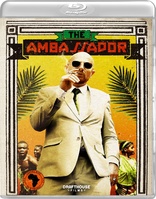The Ambassador Blu-ray Movie
HomeThe Ambassador Blu-ray Movie 
Blu-ray + Digital CopyImage Entertainment | 2011 | 93 min | Not rated | Oct 23, 2012
Movie rating
7.2 | / 10 |
Blu-ray rating
| Users | 4.0 | |
| Reviewer | 3.5 | |
| Overall | 3.5 |
Overview
The Ambassador (2011)
An enigmatic white diplomat arrives in central Africa sporting dark glasses, riding boots, and a cigarette holder. Officially, he is there to start a factory that will employ locals to produce matches. Unofficially, he has really come to gain access to the area’s vast reserves of diamonds. It soon becomes apparent that, in this post-colonial economy, nearly everyone is out to rip off everyone else, and the dangers become all too real.
Starring: Mads BrüggerDirector: Mads Brügger
| Documentary | 100% |
Specifications
Video
Video codec: MPEG-4 AVC
Video resolution: 1080p
Aspect ratio: 1.78:1
Original aspect ratio: 1.85:1
Audio
English: Dolby Digital 2.0 (192 kbps)
Also Danish, French & Sango (same track)
Subtitles
English
Discs
25GB Blu-ray Disc
Single disc (1 BD)
Digital copy (as download)
Playback
Region A (B, C untested)
Review
Rating summary
| Movie | 4.0 | |
| Video | 3.5 | |
| Audio | 2.5 | |
| Extras | 2.0 | |
| Overall | 3.5 |
The Ambassador Blu-ray Movie Review
Loving the Alien
Reviewed by Michael Reuben October 20, 2012What can you possibly do for a more dangerous encore after venturing into Kim Jong-il's North Korea masquerading as the manager of a comedy troupe to make a documentary about life under the dictator's regime? Danish TV journalist Mads Brügger won the 2010 Grand Jury prize at Sundance for Red Chapel, his feature-length documentary based on the television show crafted from his adventures in the "dear leader's" realm. For his next venture, Brügger went farther off the map: into the Central African Republic (or "CAR"), a blighted former French colony about the size of Texas that lies in almost the exact center of the continent. Neighboring countries include Chad, the Congo, Cameroon and the Sudan. The war-torn Sudanese region of Darfur directly borders the CAR on the northeast. The CAR is so little known outside Africa that, according to Brügger, when the U.S. helped evacuate deposed Haitian President Jean-Bertrand Aristide to the CAR in 2004, the plane's pilot had to radio the State Department to confirm that such a country actually exists. Still recovering from centuries of European exploitation, the CAR is beset by poverty and a lack of industrial development, despite an abundance of available labor and a wealth of natural resources. The reason, as one government official explains to Brügger, is a habit taught by the French when they ruled the land as colonists: corruption. (The official himself is a Frenchman, and he is no longer available by the end of Brügger's stay in the CAR.) Starting a business threatens a status quo that is profitable for many people connected by bonds of blood, history and mutual advantage. These bonds, and some of the people entangled in them, are generally invisible to an outsider, but they remain zealously protected. That's not to say a foreigner can't still profit from the CAR, but he has to learn how to play the game. The Ambassador documents Brügger's efforts to become a player by obtaining certification as a diplomat so that he can move freely in and out of the CAR, smuggling so-called "conflict diamonds" (a/k/a "blood diamonds") on his travels. "Conflict diamonds" are those whose sale finances war or insurgency, and major diamond-consuming countries like the U.S. and Canada have become increasingly restrictive of their importation. Thus, if conflict diamonds can be smuggled out of a tainted region and "laundered" through a European dealer, they become an exceptionally valuable commodity.
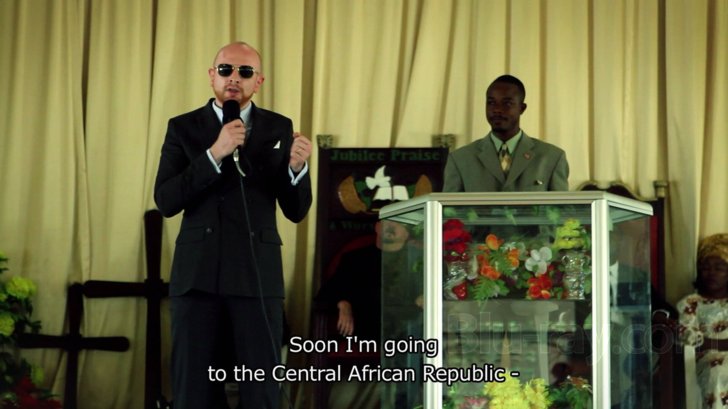
Brügger's film has the absurdist quality of a "mockumentary", which some viewers initially think it is. However, everything in The Ambassador is real, except for Brügger himself, who's a reporter playing a role to get a story. Brügger's investigation advances on several different levels, which could be considered "subplots". Each subplot is full of outlandish characters. First, Brügger has to buy himself a diplomatic position. This turns out to be an easy process to initiate, because there are brokers who specialize in obtaining diplomatic credentials for those willing to pay the price. Using hidden cameras, Brügger records meetings with a British national named Colin Evans (who makes it clear he doesn't want the meeting recorded) and a Dutchman named Willem Tjissen, who claims to represent a well-connected but invisible boss named Dr. Eastman. Brügger never meets or talks to Eastman, but Tjissen does deliver a passport and papers declaring Brügger, a white Danish national, to be consul to the CAR on behalf of the tiny African nation of Liberia. It's enough to get Brügger started, but drama continues throughout the film as Tjissen fails to get Brügger's credentials confirmed by the Liberian authorities. Brügger spends much of The Ambassador burdened by the anxiety that some CAR official may contact Liberia and be told that he's a fraud. Meanwhile, Tjissen keeps telephoning from all over the world with excuses of such increasing transparency that any real businessman would have packed it in long ago. Brügger, of course, had a film to complete. Second, Brügger has to at least pretend to be in the CAR for a legitimate business purpose. In this regard, he hobnobs with numerous locals, including the phlegmatic head of state security, Guy-Jean Le Foll Yamandé, a former member of the French Foreign Legion. (On the commentary track, Brügger compares Yamandé to Marlon Brando's Kurtz in Apocalypse Now. He could also be Orson Welles's Capt. Quinlan in Touch of Evil.) Brügger announces plans to build a match factory, which upon analysis turns out to be an economically viable concept, because space, labor and raw materials are easy to obtain, and the only competition are matches imported from Cameroon. But the red tape is endless. An Indian consul who tried the same thing a few years earlier tells Brügger to forget it, but Brügger presses on, knowing that he has no intention of ever really manufacturing matches. He just needs a good cover story. Already in his activities as prospective manufacturer, Brügger has had to learn about distributing "envelopes of happiness", which is the code name for cash bribes to ensure the cooperation of public officials. But the real payoffs occur at the third, clandestine level of his activities, where he strikes a deal with the owner of a diamond mine named Dalkia Gilbert. As Brügger says, who would expect an African diamond miner to have a gold tooth, a machete scar on his face and clothing straight out of a Seventies blaxploitation film? If you made up such a character, people would say he wasn't credible. Brügger's negotiations to buy diamonds are almost comical in their insanity. He negotiates a separate contract with Monsieur Gilbert, because the CAR standard government contract for miners would oblige him to pay all of Gilbert's expenses, over which Brügger would have no control. At the contract signing, however, Gilbert demands that Brügger pay him 50% more than they previously agreed. A deal is eventually finalized, and Gilbert walks into the night with a bag full of cash, but then Brügger can't even get a copy of the contract from his own lawyer, who, he only now learns, is a blood relation of Gilbert. Suddenly, Paul, Brügger's chargé d'affaires (a French term for a senior diplomat), appears with the standard government contract, insisting that Brügger sign it anyway, because the one he signed with Gilbert is "illegal". But don't worry, Paul assures Brügger; the deal you signed with Brügger will still hold, even though it's against the law. By this point, neither Brügger nor the audience knows what to believe. Occasionally Brügger is able to take his cameras beyond the capital city of Bangui into the beautiful but perilous regions beyond. Thieves, rebels and wildlife are among the dangers threatening from all directions. The pilot of the plane Brügger charters to visit Gilbert's mine is so skittish about being outside Bangui that he tells Brügger he'll leave him behind if Brügger is even a minute late for the return flight. Eventually, diamonds do make an appearance, but at that point Brügger abruptly brings down the curtain. He knows that, like the women they're most likely to adorn, these stones are more attractive when they retain their mystery. If you want to know the full story, listen to the commentary.
The Ambassador Blu-ray Movie, Video Quality 
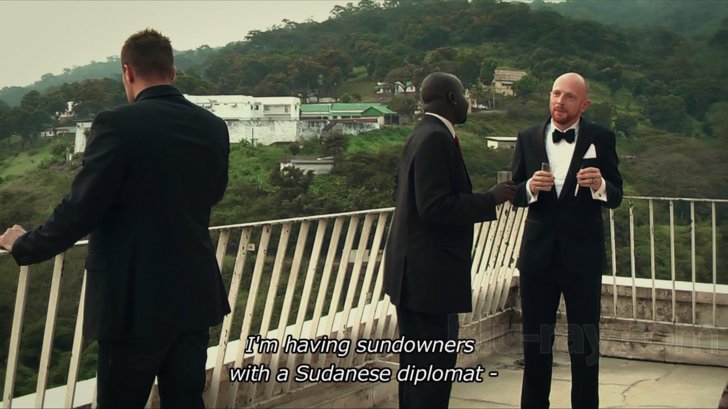
The Ambassador was shot with a variety of video cameras, and the image on Image Entertainment's 1080p, AVC-encoded Blu-ray varies in quality according the source material. Footage acquired in hi-def is sharp, detailed and colorful, with excellent blacks and well-saturated, often vibrant colors. If the quality never quite reaches the level of a digitally acquired feature film, that is no doubt the result of using smaller, lighter cameras with which Brügger and his staff could travel easily and inconspicuously. Other footage was captured with tiny hidden cameras, such as the meeting with credentials broker Colin Evans, who can be heard repeatedly instructing Brügger to leave his phone and take off his jacket, so that their meeting can't be recorded. Fortunately for Brügger (and us), Evans never followed through on the jacket part, and Brügger recorded the meeting on a camera concealed under his jacket. The footage isn't anything special to look at, but documenting the meeting was a triumph. (After the film came out, Evans was forced to shut down his website, although he has undoubtedly found a way to restart it elsewhere.) Because Brügger and crew were shooting "on the fly" and without any opportunity to light or rearrange the scene, some shots show video noise, usually in the distance on surfaces with reflections or too much fine detail. These instances are occasional and minor.
The Ambassador Blu-ray Movie, Audio Quality 
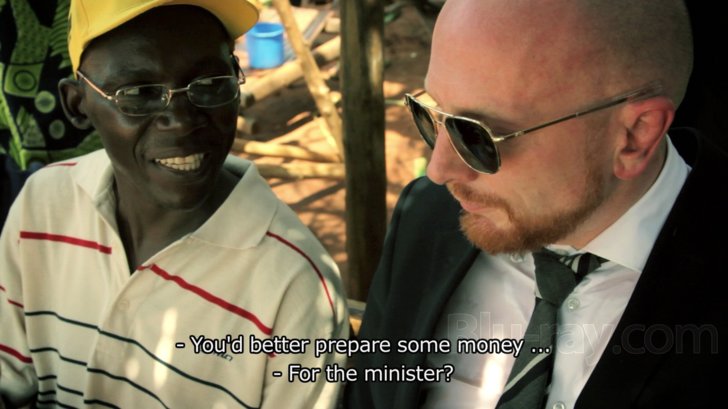
The sole audio track is DD 2.0. Now, before anyone gets too worked up about the lack of a lossless option, take a moment to understand what's on the track. The soundtrack of The Ambassador consists of a cacophony of voices speaking multiple languages: English, French, Danish and Sango (the language of the CAR). Everyone who speaks in English has a thick accent, including Brügger, who narrates the film, and all of the voices (other than the narration) have been recorded on the scene as production sound, which means that they're frequently muffled and indistinct. So the question is, how much difference would a lossless track make to a scene featuring a negotiation between a Danish-speaking Brügger and a French-speaking diamond mine owner, with a translator alternating between them? Indeed, so concerned are the film's and disc's producers that the linguistic melange will confuse the viewer's ear that they have provided English subtitles for everything (including the English portions), and these subtitles cannot be switched off. This is a disc that's more likely to be read than listened to, except that the voices supply a valuable sense of the cross-cultural chatter that underlies the deadlock in the CAR. A musical score by Niklas Schak and Tin Soheiliis is also part of the track, but it is used sparingly and at such low volume in the background that it blends easily into the ambiance. More prominent are the few song selections that play ironically over certain scenes, notably The Inkspots' "I Don't Wanna Set the World on Fire" and Woody Guthrie's "This Land Is Your Land".
The Ambassador Blu-ray Movie, Special Features and Extras 
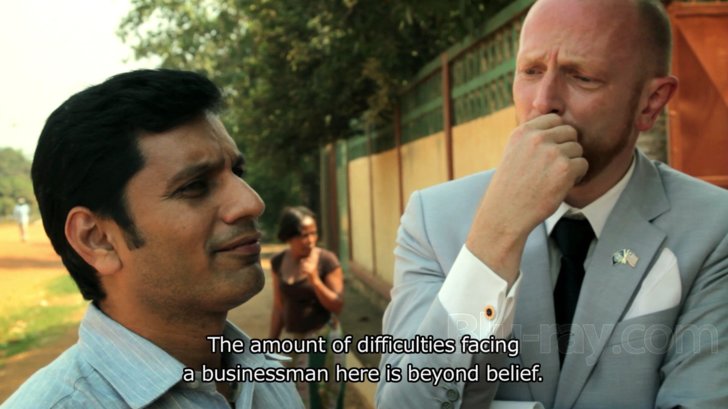
- Commentary with Director-Writer-Star Mads Brügger: Brügger's commentary, which is in English, serves almost as an alternate narration to the film, except that he tends to fall silent for extended periods during the latter half. (He does say it's the first time he's done a commentary.) Although the passage of additional time has given Brügger a calmer perspective on his adventure, he retains the same dry wit that helped keep him going in the CAR. A typical example: "Once you realize that the central reality principle in the Central African Republic is that there is no reality principle, you actually begin to relax." Brügger is particularly good on describing how he felt during some of the scenes (e.g., terrified when he was talking to Evans), and he also provides information on developments after the film's release. He does not, however, mention that the government of Liberia has attempted to prosecute him and his team for their revelations about its willingness to sell diplomatic credentials.
- Theatrical Trailer (HD, 1080p; 1.78:1; 2:07): A comical overview.
- Drafthouse Films Trailers (HD, 1080p)
- Booklet: A full-color insert with photographs and credits.
The Ambassador Blu-ray Movie, Overall Score and Recommendation 
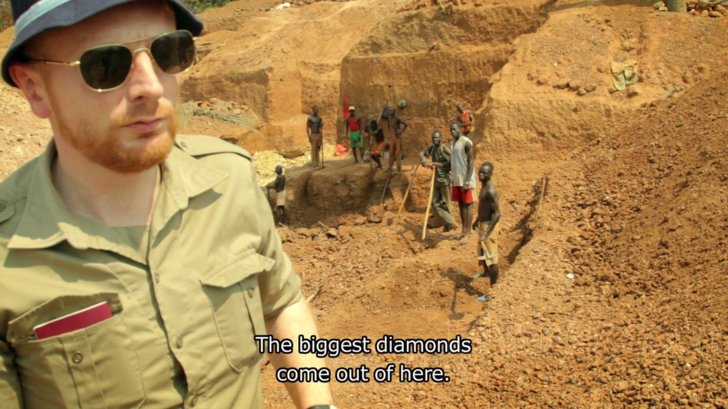
I love films like The Ambassador, because they challenge our notion of what is or isn't "impossible" or "improbable". Viewers constantly respond to fiction films (or novels) by insisting that this or that event or (character) couldn't possibly happen (or exist) in real life, but reality is so much bigger than any one individual's tiny slice of experience. For those willing to have their eyes opened, documentaries like this one introduce you to people and places that, if someone made them up, you might not believe. Even the little side incidents are startling. When the participants are toasting the signing of the diamond contract, listen to the conversation about Hitler and pay close attention to the attitude exhibited by Brügger's chargé d'affaires, Paul. You'll suddenly realize that things we take for granted look a whole lot different from the outlook of a part of the world we can barely begin to imagine. Highly recommended.
Similar titles
Similar titles you might also like

Harlan County U.S.A.
1976

The Look of Silence
2014

Fire at Sea
Fuocoammare
2016

General Idi Amin Dada: A Self-Portrait
Général Idi Amin Dada: Autoportrait
1974

God's Angry Man
1981

The Act of Killing
2012

Man with a Movie Camera
Человек с киноаппаратом / Chelovek s kino-apparatom
1929

Twenty Years Later
Cabra Marcado para Morrer / A Man Marked for Death
1984

America: Imagine the World Without Her
2014

The Atomic Cafe
1982

The Salt of the Earth
Le Sel de la Terre
2014

Dawson City: Frozen Time
2016

Black Panthers
1968

Powaqqatsi
1988

Fahrenheit 11/9
2018

A Place at the Table
2012

Why We Fight
2005

Capitalism: A Love Story
2009

Enron: The Smartest Guys in the Room
2005

When We Were Kings
1996
